Unit 2 What time do you go to school? Section B 3a—Self Check课件(共25张PPT) 人教版英语七年级下册
文档属性
| 名称 | Unit 2 What time do you go to school? Section B 3a—Self Check课件(共25张PPT) 人教版英语七年级下册 |
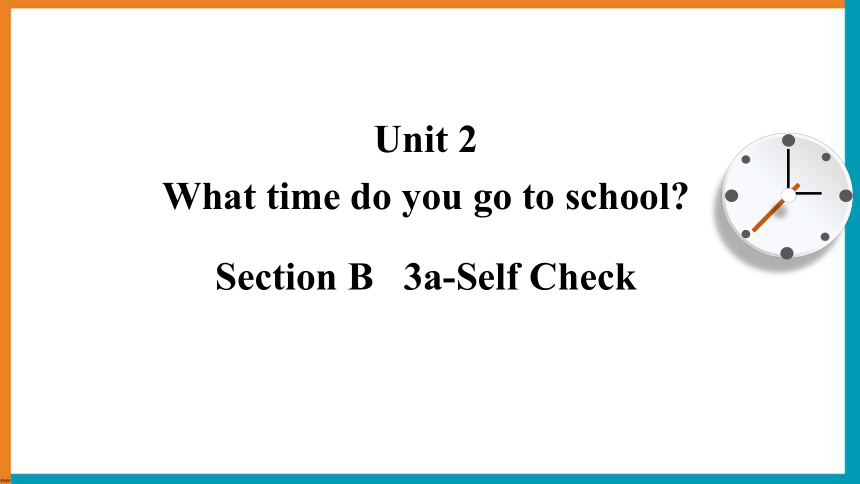
|
|
| 格式 | pptx | ||
| 文件大小 | 6.8MB | ||
| 资源类型 | 教案 | ||
| 版本资源 | 人教新目标(Go for it)版 | ||
| 科目 | 英语 | ||
| 更新时间 | 2024-02-03 00:00:00 | ||
图片预览

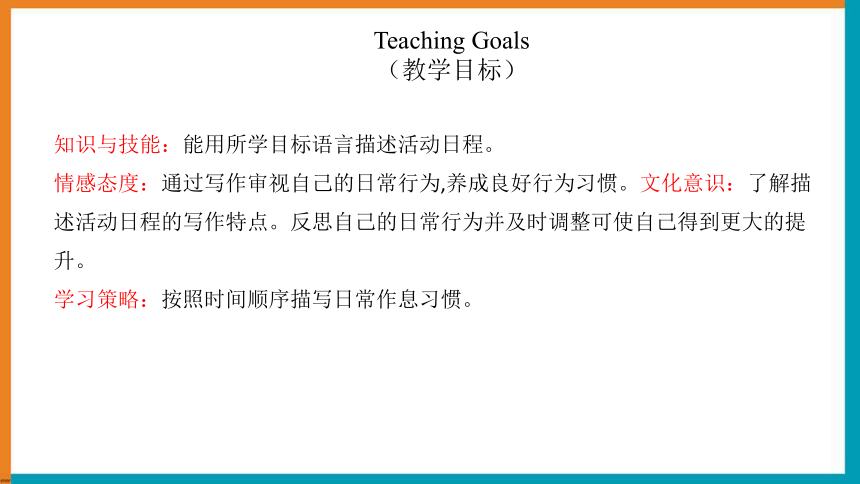

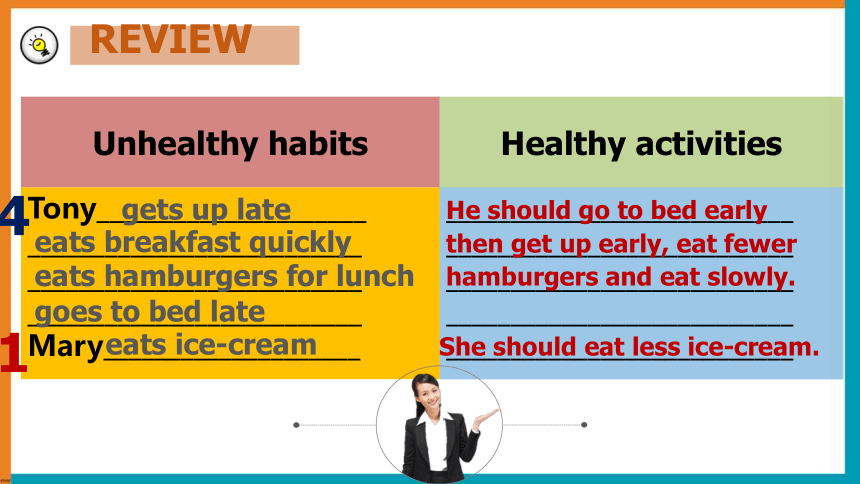

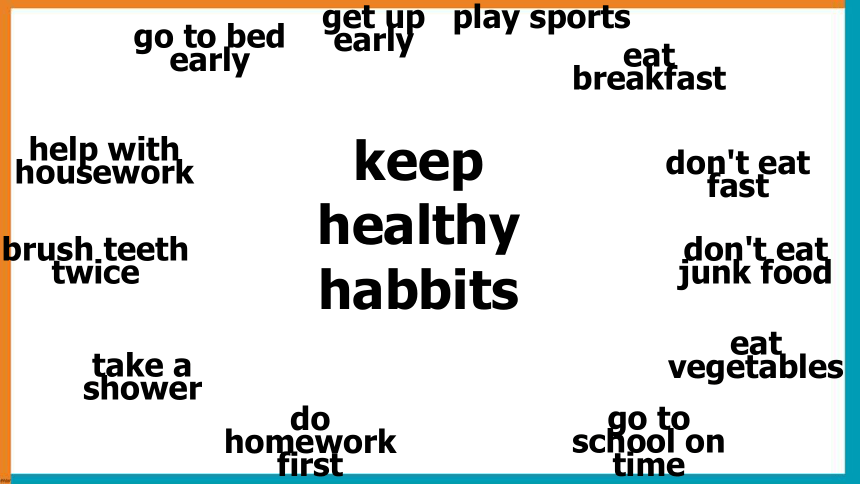
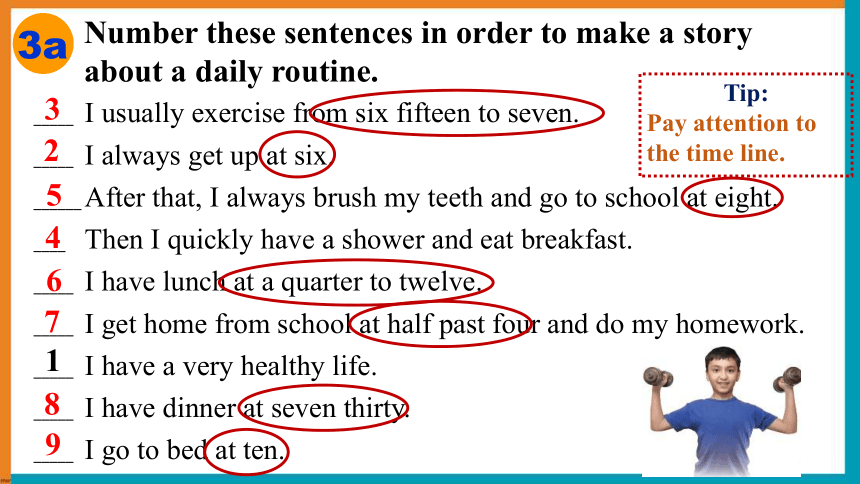
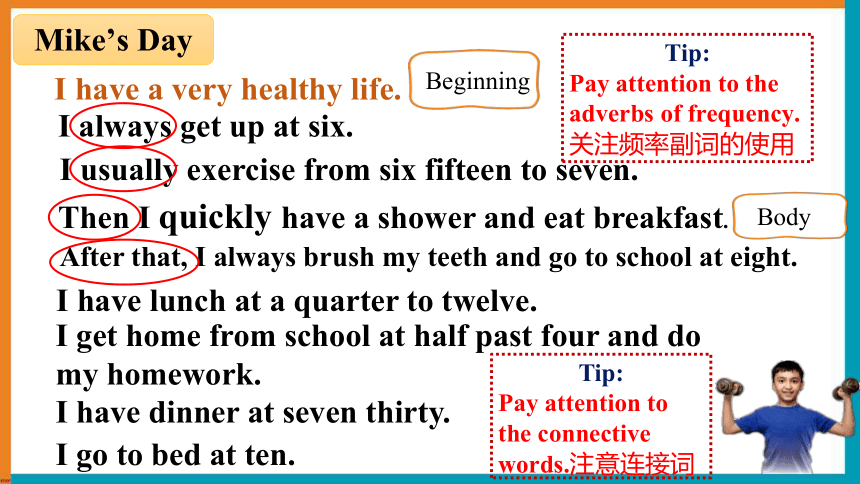
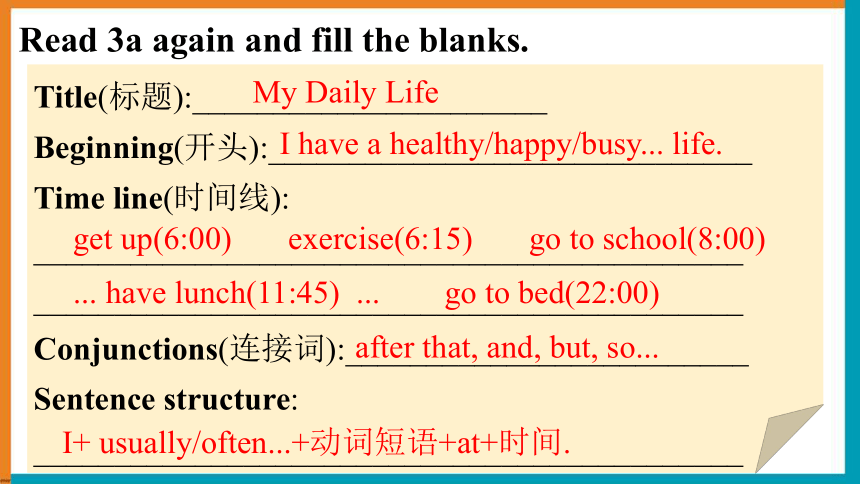
文档简介
(共25张PPT)
Unit 2
What time do you go to school
Section B 3a-Self Check
知识与技能:能用所学目标语言描述活动日程。
情感态度:通过写作审视自己的日常行为,养成良好行为习惯。文化意识:了解描述活动日程的写作特点。反思自己的日常行为并及时调整可使自己得到更大的提升。
学习策略:按照时间顺序描写日常作息习惯。
Teaching Goals
(教学目标)
Let's
Review
Do you remember
Tony and Mary's habbits
What are healthy
What are unhealthy
Unhealthy habits
Tony_____________________
__________________________
__________________________
__________________________
Mary____________________
Healthy activities
REVIEW
___________________________
___________________________
___________________________
___________________________
___________________________
4
1
gets up late
eats breakfast quickly
eats hamburgers for lunch
goes to bed late
eats ice-cream
He should go to bed early then get up early, eat fewer hamburgers and eat slowly.
She should eat less ice-cream.
Talk&
Think
How do we keep
healthy habbits
keep
healthy
habbits
go to bed
early
get up
early
play sports
eat breakfast
don't eat fast
don't eat junk food
eat vegetables
go to school on time
do homework first
take a shower
brush teeth twice
help with housework
_____
_____
__________
_____
_____
_____
_____
_____
I usually exercise from six fifteen to seven.
I always get up at six.
After that, I always brush my teeth and go to school at eight.
Then I quickly have a shower and eat breakfast.
I have lunch at a quarter to twelve.
I get home from school at half past four and do my homework.
I have a very healthy life.
I have dinner at seven thirty.
I go to bed at ten.
Number these sentences in order to make a story
about a daily routine.
3
4
2
5
6
9
7
8
Tip:
Pay attention to the time line.
1
3a
I usually exercise from six fifteen to seven.
I have a very healthy life.
I always get up at six.
After that, I always brush my teeth and go to school at eight.
I have lunch at a quarter to twelve.
I get home from school at half past four and do
my homework.
I have dinner at seven thirty.
I go to bed at ten.
Then I quickly have a shower and eat breakfast.
Tip:
Pay attention to the connective words.注意连接词
Tip:
Pay attention to the adverbs of frequency.关注频率副词的使用
Beginning
Body
Mike’s Day
Title(标题):______________________
Beginning(开头):______________________________
Time line(时间线):
____________________________________________
____________________________________________
Conjunctions(连接词):_________________________
Sentence structure: ____________________________________________
My Daily Life
I have a healthy/happy/busy... life.
get up(6:00) exercise(6:15) go to school(8:00)
... have lunch(11:45) ... go to bed(22:00)
after that, and, but, so...
I+ usually/often...+动词短语+at+时间.
Read 3a again and fill the blanks.
Write about you own daily routine.
___________________________________________________________________________________________________________________________________________________________________________________________________________________________
_________________________________________________________________________
_________________________________________________________________________
_________________________________________________________________________
3b
My School Day
总
引出话题
分
具体描写
总
发出感想
Let me tell you about my school life.
I get up at ...
I eat breakfast at ...
I eat lunch at ...
I have a busy day, but I’m very happy.
梳理脉络
My School Day
I am a student. Do you want to know about my school day
I usually get up at 7:00,and I eat breakfast at about seven thirty. I go to school at 8:00. Then I eat lunch at 12:00. After classes I get home at 17:00. I often eat dinner at 19:00 and then play the piano. After that, I do my homework at 20:00. I go to bed at 22:00.
I have a busy day, but I’m very happy.
范文赏析
写 作 指 导
回想一下上个环节中自己一天的作息。
按时间的先后,逐条叙述。
注意运用正确的英语表达方式:
I + usually / often + 动词短语 + at + 时间。
One possible version
I have a healthy life. I usually get up at seven. I exercise from a quarter past seven to half past seven. Then I have breakfast and brush my teeth. I go to school at eight o'clock. I have lunch at twelve o'clock. I get home from school at half past four and do my homework. I have dinner at six then I watch TV. I go to bed at nine thirty.
Think about your weekends' activities My weekends
Activities Time
morning get up
exercise
eat breakfast
noon have lunch
afternoon play sports
meet friends
evening eat dinner
watch TV
go to bed
Tell your classmates about your life on weekends.
I have a relaxing weekend. I usually get up at eight. Then I exercise for half an hour. I eat breakfast at nine. I brush my teeth at nine past twenty. I...
Self check
1. Match the verbs in column A with the words in column B. Then use the phrases to complete the sentences.
A
taste
clean
have
get
take
brush
B
your teeth
my room
a walk
good
dressed
a good job
1. Ice-cream usually _______________ so students like to eat it after school.
2. My grandparents are very healthy. They always ______________ after dinner.
3. You need to _______________ after eating to have good teeth.
4. He ___________. He works at a radio station.
brush your teeth
tastes good
a walk
take
has a good job
5. Here are your clothes. Go and _______________ quickly!
6. I don’t have time to ___________________ from Monday to Friday. So I clean it on weekends.
get dressed
clean my room
2. Complete the conversations with questions and
answers. Use the words in brackets to help you.
1.A.______________________________________
(your mother/usually/get up)
B._____________________________________.
(5:45)
What time does your mother usually get up
She usually gets up at 5:45 in the morning
A:_________________________________________
(why/get up/so early )
B:_________________________________________.
(always/make breakfast for me)
Why does she get up so early
Because she always makes breakfast for me
2.A.____________________________________
(you/usually/get to school) B.______________________________________.
(7:30)
What time do you usually get to school
I usually get to school at 7:30 in the morning
A:_________________________________________
(your class teacher/usually/get to school)
B: I don’t know. But he/she is never late for the first class in the morning.
What time does your class teacher usually get to school
Typical exercises:
1.The students are busy. They have____ to do.
A. many homework B. a lot of homeworks
C. much homeworks D. a lot of homework
2.There are two seats, nobody sits here, you can take
_______ the left one ______ the right one.
A.both;and B.either;nor C.either;and D. either;or
3.Doing sports _________us. We should often exercise.
A. is good for B. is not good for
C. is good with D. is good at
4.These apples look ______but taste _____.
A. good;good B.good;bad C.well;bad D.badly; well
按要求完成句子。
1. Her sister works at a radio station. (改为一般疑问句)
_______ her sister _______ at a radio station
2. When do you get up?(改为同义句)
_______ _______ do you get up
3. I run at 7:00 in the morning (对划线部分提问)
_______ _______ do you run in the morning
Does work
What time
What time
4. He gets up at seven in the morning.(改为否定句)
He _______ _______ up at seven in the morning.
5. Alice wants to know about my morning.(改为一般
疑问句)
_______ Alice _______ to know about your morning
doesn’t get
Does want
Mind Map
daily routines
daily activities
times
adverbs of frequency
talk about daily routines
write about daily routines
Homework
1. Check your writing after class.
2. Ask one of your classmates about his daily routine. Write a letter to tell who has healthier habits, you or your classmate. Why do you think so If he or she has some unhealthy habits, give advice to him or her.
Unit 2
What time do you go to school
Section B 3a-Self Check
知识与技能:能用所学目标语言描述活动日程。
情感态度:通过写作审视自己的日常行为,养成良好行为习惯。文化意识:了解描述活动日程的写作特点。反思自己的日常行为并及时调整可使自己得到更大的提升。
学习策略:按照时间顺序描写日常作息习惯。
Teaching Goals
(教学目标)
Let's
Review
Do you remember
Tony and Mary's habbits
What are healthy
What are unhealthy
Unhealthy habits
Tony_____________________
__________________________
__________________________
__________________________
Mary____________________
Healthy activities
REVIEW
___________________________
___________________________
___________________________
___________________________
___________________________
4
1
gets up late
eats breakfast quickly
eats hamburgers for lunch
goes to bed late
eats ice-cream
He should go to bed early then get up early, eat fewer hamburgers and eat slowly.
She should eat less ice-cream.
Talk&
Think
How do we keep
healthy habbits
keep
healthy
habbits
go to bed
early
get up
early
play sports
eat breakfast
don't eat fast
don't eat junk food
eat vegetables
go to school on time
do homework first
take a shower
brush teeth twice
help with housework
_____
_____
__________
_____
_____
_____
_____
_____
I usually exercise from six fifteen to seven.
I always get up at six.
After that, I always brush my teeth and go to school at eight.
Then I quickly have a shower and eat breakfast.
I have lunch at a quarter to twelve.
I get home from school at half past four and do my homework.
I have a very healthy life.
I have dinner at seven thirty.
I go to bed at ten.
Number these sentences in order to make a story
about a daily routine.
3
4
2
5
6
9
7
8
Tip:
Pay attention to the time line.
1
3a
I usually exercise from six fifteen to seven.
I have a very healthy life.
I always get up at six.
After that, I always brush my teeth and go to school at eight.
I have lunch at a quarter to twelve.
I get home from school at half past four and do
my homework.
I have dinner at seven thirty.
I go to bed at ten.
Then I quickly have a shower and eat breakfast.
Tip:
Pay attention to the connective words.注意连接词
Tip:
Pay attention to the adverbs of frequency.关注频率副词的使用
Beginning
Body
Mike’s Day
Title(标题):______________________
Beginning(开头):______________________________
Time line(时间线):
____________________________________________
____________________________________________
Conjunctions(连接词):_________________________
Sentence structure: ____________________________________________
My Daily Life
I have a healthy/happy/busy... life.
get up(6:00) exercise(6:15) go to school(8:00)
... have lunch(11:45) ... go to bed(22:00)
after that, and, but, so...
I+ usually/often...+动词短语+at+时间.
Read 3a again and fill the blanks.
Write about you own daily routine.
___________________________________________________________________________________________________________________________________________________________________________________________________________________________
_________________________________________________________________________
_________________________________________________________________________
_________________________________________________________________________
3b
My School Day
总
引出话题
分
具体描写
总
发出感想
Let me tell you about my school life.
I get up at ...
I eat breakfast at ...
I eat lunch at ...
I have a busy day, but I’m very happy.
梳理脉络
My School Day
I am a student. Do you want to know about my school day
I usually get up at 7:00,and I eat breakfast at about seven thirty. I go to school at 8:00. Then I eat lunch at 12:00. After classes I get home at 17:00. I often eat dinner at 19:00 and then play the piano. After that, I do my homework at 20:00. I go to bed at 22:00.
I have a busy day, but I’m very happy.
范文赏析
写 作 指 导
回想一下上个环节中自己一天的作息。
按时间的先后,逐条叙述。
注意运用正确的英语表达方式:
I + usually / often + 动词短语 + at + 时间。
One possible version
I have a healthy life. I usually get up at seven. I exercise from a quarter past seven to half past seven. Then I have breakfast and brush my teeth. I go to school at eight o'clock. I have lunch at twelve o'clock. I get home from school at half past four and do my homework. I have dinner at six then I watch TV. I go to bed at nine thirty.
Think about your weekends' activities My weekends
Activities Time
morning get up
exercise
eat breakfast
noon have lunch
afternoon play sports
meet friends
evening eat dinner
watch TV
go to bed
Tell your classmates about your life on weekends.
I have a relaxing weekend. I usually get up at eight. Then I exercise for half an hour. I eat breakfast at nine. I brush my teeth at nine past twenty. I...
Self check
1. Match the verbs in column A with the words in column B. Then use the phrases to complete the sentences.
A
taste
clean
have
get
take
brush
B
your teeth
my room
a walk
good
dressed
a good job
1. Ice-cream usually _______________ so students like to eat it after school.
2. My grandparents are very healthy. They always ______________ after dinner.
3. You need to _______________ after eating to have good teeth.
4. He ___________. He works at a radio station.
brush your teeth
tastes good
a walk
take
has a good job
5. Here are your clothes. Go and _______________ quickly!
6. I don’t have time to ___________________ from Monday to Friday. So I clean it on weekends.
get dressed
clean my room
2. Complete the conversations with questions and
answers. Use the words in brackets to help you.
1.A.______________________________________
(your mother/usually/get up)
B._____________________________________.
(5:45)
What time does your mother usually get up
She usually gets up at 5:45 in the morning
A:_________________________________________
(why/get up/so early )
B:_________________________________________.
(always/make breakfast for me)
Why does she get up so early
Because she always makes breakfast for me
2.A.____________________________________
(you/usually/get to school) B.______________________________________.
(7:30)
What time do you usually get to school
I usually get to school at 7:30 in the morning
A:_________________________________________
(your class teacher/usually/get to school)
B: I don’t know. But he/she is never late for the first class in the morning.
What time does your class teacher usually get to school
Typical exercises:
1.The students are busy. They have____ to do.
A. many homework B. a lot of homeworks
C. much homeworks D. a lot of homework
2.There are two seats, nobody sits here, you can take
_______ the left one ______ the right one.
A.both;and B.either;nor C.either;and D. either;or
3.Doing sports _________us. We should often exercise.
A. is good for B. is not good for
C. is good with D. is good at
4.These apples look ______but taste _____.
A. good;good B.good;bad C.well;bad D.badly; well
按要求完成句子。
1. Her sister works at a radio station. (改为一般疑问句)
_______ her sister _______ at a radio station
2. When do you get up?(改为同义句)
_______ _______ do you get up
3. I run at 7:00 in the morning (对划线部分提问)
_______ _______ do you run in the morning
Does work
What time
What time
4. He gets up at seven in the morning.(改为否定句)
He _______ _______ up at seven in the morning.
5. Alice wants to know about my morning.(改为一般
疑问句)
_______ Alice _______ to know about your morning
doesn’t get
Does want
Mind Map
daily routines
daily activities
times
adverbs of frequency
talk about daily routines
write about daily routines
Homework
1. Check your writing after class.
2. Ask one of your classmates about his daily routine. Write a letter to tell who has healthier habits, you or your classmate. Why do you think so If he or she has some unhealthy habits, give advice to him or her.
同课章节目录
- Unit 1 Can you play the guitar?
- Section A
- Section B
- Unit 2 What time do you go to school?
- Section A
- Section B
- Unit 3 How do you get to school?
- Section A
- Section B
- Unit 4 Don't eat in class.
- Section A
- Section B
- Unit 5 Why do you like pandas?
- Section A
- Section B
- Unit 6 I'm watching TV.
- Section A
- Section B
- Review of Units 1-6
- Unit 7 It's raining!
- Section A
- Section B
- Unit 8 Is there a post office near here?
- Section A
- Section B
- Unit 9 What does he look like?
- Section A
- Section B
- Unit 10 I'd like some noodles.
- Section A
- Section B
- Unit 11 How was your school trip?
- Section A
- Section B
- Unit 12 What did you do last weekend?
- Section A
- Section B
